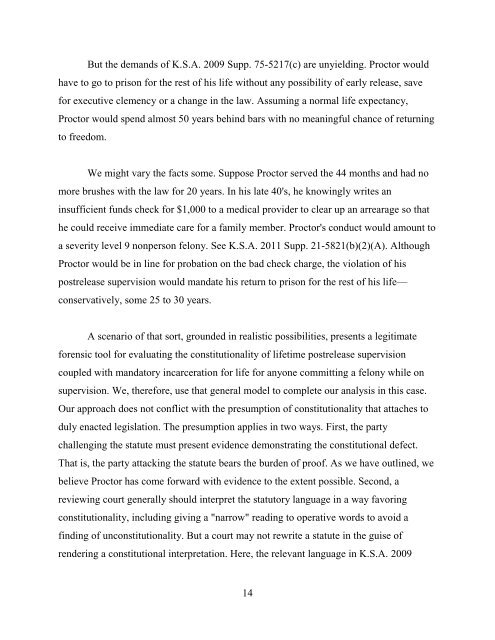State v. Proctor - Kansas Judicial Branch
State v. Proctor - Kansas Judicial Branch
State v. Proctor - Kansas Judicial Branch
Create successful ePaper yourself
Turn your PDF publications into a flip-book with our unique Google optimized e-Paper software.
But the demands of K.S.A. 2009 Supp. 75-5217(c) are unyielding. <strong>Proctor</strong> would<br />
have to go to prison for the rest of his life without any possibility of early release, save<br />
for executive clemency or a change in the law. Assuming a normal life expectancy,<br />
<strong>Proctor</strong> would spend almost 50 years behind bars with no meaningful chance of returning<br />
to freedom.<br />
We might vary the facts some. Suppose <strong>Proctor</strong> served the 44 months and had no<br />
more brushes with the law for 20 years. In his late 40's, he knowingly writes an<br />
insufficient funds check for $1,000 to a medical provider to clear up an arrearage so that<br />
he could receive immediate care for a family member. <strong>Proctor</strong>'s conduct would amount to<br />
a severity level 9 nonperson felony. See K.S.A. 2011 Supp. 21-5821(b)(2)(A). Although<br />
<strong>Proctor</strong> would be in line for probation on the bad check charge, the violation of his<br />
postrelease supervision would mandate his return to prison for the rest of his life—<br />
conservatively, some 25 to 30 years.<br />
A scenario of that sort, grounded in realistic possibilities, presents a legitimate<br />
forensic tool for evaluating the constitutionality of lifetime postrelease supervision<br />
coupled with mandatory incarceration for life for anyone committing a felony while on<br />
supervision. We, therefore, use that general model to complete our analysis in this case.<br />
Our approach does not conflict with the presumption of constitutionality that attaches to<br />
duly enacted legislation. The presumption applies in two ways. First, the party<br />
challenging the statute must present evidence demonstrating the constitutional defect.<br />
That is, the party attacking the statute bears the burden of proof. As we have outlined, we<br />
believe <strong>Proctor</strong> has come forward with evidence to the extent possible. Second, a<br />
reviewing court generally should interpret the statutory language in a way favoring<br />
constitutionality, including giving a "narrow" reading to operative words to avoid a<br />
finding of unconstitutionality. But a court may not rewrite a statute in the guise of<br />
rendering a constitutional interpretation. Here, the relevant language in K.S.A. 2009<br />
14

















